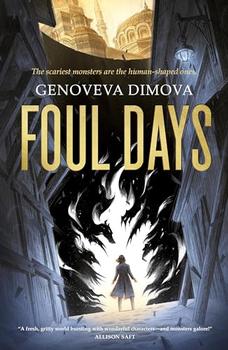Summary | Excerpt | Reviews | Beyond the book | Read-Alikes | Genres & Themes | Author Bio

The Witch's Compendium of Monsters #1
by Genoveva DimovaThe Foul Days have arrived. Every year on New Year's Eve, terrifying monsters descend on the mortal world like a hailstorm to wreak havoc upon the citizens of Chernograd for twelve days. Cut off from their sister city Belograd, Chernograd's inhabitants are trapped. Crossing the wall between them is dangerous, though not impossible with the help of magic, for which many trade everything they own in order to escape.
Young witch Kosara is not one of them. Though tormented by a tragic history, past mistakes, and her powerful demonic ex, the Zmey, she prefers to stay in Chernograd to learn more magic and help her people deal with the monsters. But when the clock strikes midnight on New Year's Eve and the monsters begin their rampage through the city, the Zmey, who has never forgiven Kosara for escaping from him, catches up with her. In her panic, Kosara makes a desperate bargain with a stranger, with devastating consequences that threaten her own life. Determined to put things right, she finds herself in a race against time, with only the twelve Foul Days to save both her city and herself.
Imaginative, exciting, and often darkly humorous, Genoveva Dimova's debut novel is by turns scary, funny, and poignant – a fast-paced, rip-roaring adventure across two cities, with monsters, magic, and a parallel supernatural realm rooted in Slavic culture. From the very beginning, the reader is plunged into an evocative, wintry, alternate yet recognizably Eastern European world, full of eerie old buildings, narrow cobbled streets covered in snowdrifts, and long, cold nights. The Bulgarian folklore aspect of the story has the timeless qualities of dark fairy tales juxtaposed with contemporary sensibilities, witty comments, and sardonic observations, lending it a refreshingly original perspective and a hauntingly ominous atmosphere permeated with welcome light relief. The educational pamphlet released every year by Chernograd's Witch and Warlock Association, provided by the author for perusal at the end of the book, is an especially delightful touch. It contains detailed information on the different types of monsters, and how to fight them or protect oneself from them. However, as Kosara observes with exasperation, nobody bothers to read it!
Despite its wit and humor, the novel does not shy away from the effects of trauma and violence, and contains a pertinent message about finding strength, hope, and faith in oneself, even in the darkest of times. These are conveyed through the character of Kosara, who works extremely well as a heroine. In the midst of all the magic, she is a very real, sympathetic, and relatable protagonist. She is resourceful, gifted, and vulnerable; physically and emotionally scarred by abuse and violence; burdened by trauma and grief; lonely, afflicted, sarcastic, and prone to making potentially fatal mistakes. Yet through it all she retains her sharp mind, her biting wit, her magical know-how, her empathy for others, and her resolution to persevere against all odds.
There is a discrepancy in the timeframe of the book, which takes place over twelve days, as is made clear by the chapter numbering. The novel opens on New Year's Eve, with several characters stating this fact and emphasizing that this is when the Foul Days begin, and it ends on St. Yordan's Day, when Kosara listens for the cockerel's crow. However, St. Yordan's Day is the 6th of January, only six days after New Year's Eve. While the exact duration of the Foul Days of Bulgarian folklore varies from region to region and fantasy requires a suspension of disbelief, a secondary fantasy world needs to have its own internal logic and consistency to be convincing as an alternate universe. By specifically using the period between New Year's Eve and St. Yordan's Day (both real holidays) and providing no explanation as to why there are twelve days between them instead of six, the novel's fantasy world does not make sense even within its own set parameters. Perhaps the author will explain this discrepancy (maybe the folkloric motif of time moving differently in supernatural realms?) to make it plausible in the forthcoming sequel.
Themes of class division, displacement, immigration, trafficking, and smuggling also resonate in the story. Chernograd is the poorer neighbor of Belograd, and we learn that the Belogradans created the magical wall to keep the monsters out of their own city, with no thought or regard for the Chernogradans. In effect, they created a kind of life-threatening ghetto and engendered a form of class warfare on both sides. However, the burgeoning friendship and will-they-won't-they slow-burning romance between Kosara and Belogradan cop Asen both transcends this divide and complicates it, since Asen has secrets of his own.
With these vivid characters and rich themes, Foul Days is entertaining and compelling, which bodes well for the second installment in the duology.
![]() This review
first ran in the July 17, 2024
issue of BookBrowse Recommends.
This review
first ran in the July 17, 2024
issue of BookBrowse Recommends.

If you liked Foul Days, try these:

by Vanessa Le
Published 2025
"A gritty world filled with a beautifully crafted cast and an intricate magic system. A smart, lush, and utterly compelling read." —Marie Lu, #1 New York Times-bestselling author of Legend

by Heather O'Neill
Published 2025
From the hugely acclaimed author beloved by literary lights, including Emily St. John Mandel, Kelly Link, and Mona Awad, a dark dystopian fairytale about an idyllic country ravaged by war—and a girl torn between safety and loyalty.
Your guide toexceptional books
BookBrowse seeks out and recommends the best in contemporary fiction and nonfiction—books that not only engage and entertain but also deepen our understanding of ourselves and the world around us.